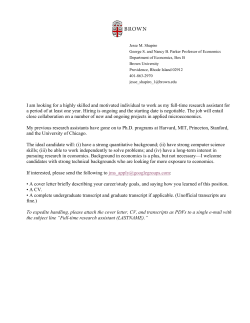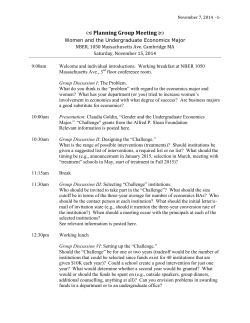
Hui Mai - Department of Economics
Hui Mai Department of Economics University of Washington Email : huimai@uw.edu Cell Phone: (510) 928-8708 EDUCATION University of Washington, Seattle 09/2009–06/2015 (Expected) Ph.D. Candidate in Economics Dissertation title: Essays on Family Economics Committee: Seik Kim(Co-Chair) , Rachel Heath(Co-Chair), Judith Thornton Peking University, Beijing, China 09/2007–07/2009 M.A. in Economics Peking University, Beijing, China 09/2003–06/2007 B.A. in Economics Fields of Interest Labor Economics, Empirical Microeconomics, Applied Econometrics, Industrial Organization Working Papers “Estimating the Effects of Family Relocation on Children’s Education and Youth Risky Behavior ” Abstract: Using individual-level data from the NLSY79 and the NLSY79 Children and Young Adults, we empirically investigate the role of family relocation on children's schooling and youth behavior problems. By exploiting the variation in sibling's age at the time of family relocation, we find no detectable negative effects of family relocation on various children’s outcomes. In addition, while the OLS estimates vary by gender and ethnicity, this variety disappears in the sibling fixed effects estimates. Our empirical results indicate that the unobserved family characteristics that drive the decision of family relocation are responsible for children’s schooling and behavior outcomes in the long run. “Estimating the Effects of School Mobility on Children’s Education, Youth Risky Behavior and Arrest History” Abstract: This study employs the variation in sibling’s age at the time of primary and high school changes (other than promotion from primary school to high school) in order to estimate the effects of school mobility on children’s education achievement, youth risky behavior such as smoking, drinking and using drugs and youth arrest history. We use individual school change history from primary education up to age 20 by 2010 from the NLSY 97 and control for sibling fixed effects to estimate how the variation in children’s age at school change would affect a set of outcome variables(schooling, youth risky behavior and arrest history). After controlling for sibling fixed effects, we find school change made at age 16-18 would significantly reduce children’s education achievement by age 20 and increase their possibility for repeating grade in school, however, we find none detectable negative impacts of school mobility on children’s risky behavior and youth arrest history comparing with their non-mobile peers. Besides, subgroup analysis by gender and by ethnicity doesn’t alter the conclusions we get from the sibling fixed effects model using the entire sample. 1 “An Intergeneration Analysis of Quantity and Quality Model Using NLSY79” Abstract: In this paper, we examine the impact of family size on maternal health outcomes by exploiting the exogenous change in family size using contraceptive failure as instrument variable while controlling for the unobserved genetic heterogeneity at the family level. Using data from the National Longitudinal Survey of Youth 1979, we find that having additional number of child would significantly decrease mother’s mental health measurement and increase the probability of depression at age 40, but it has none significant impact on mother's physical health. We don't find the negative impacts of family size on mother's BMI suggested by results from developing countries using fixed effects model. This result indicates a different story for developed country where resources are more affluent that mother's nutrition intake and long run physical health would be taken care of while the mental pressure and time investment of raising children would be a major health concern for mothers in the long run. Working in Progress “Missing Father Figure and the impact on Children’s Outcome” “Marriage, Fertility Timing and Women’s Wage Growth” “Impatience and Individuals Long Term Health” Teaching Experience Department of Economics, University of Washington, Seattle Instructor, Introduction to Microeconomics, Autumn, 2011, Autumn 2012, Winter 2012 Teaching Assistant, Introduction to Microeconomics Autumn 2010, Winter 2011 Teaching Assistant, Introduction to Macroeconomics Winter 2011, Spring 2011 Working Experience Amazon, Seattle Data Analyst (Contractor) 12/2012- 09/2013 Working directly with Principal Economist on key business problems faced in retail, third party merchants and business operations. Analyzing and understanding large amounts of Amazon’s historical business data to detect patterns, to analyze trends and to identify correlations and causalities. Establishing scalable, efficient, automated processes for big data analyses, model development, model validation and model implementation using different software tools. Working closely with Machine Learning Seller Service team to drive real-time model implementations and new feature creations and working closely with Operation teams to optimize operation cost and efficiency. Act as bridge between Solution Architect and Business Users. Auri International Consulting, Beijing Summer Intern 05/2007–07/2007 Working closely with business stakeholders to elicit and gather business requirements and market data to implement “Oversea Study Tour” project in Beijing area. Producing high level estimates and feasibility studies for this proposed project by comparing with similar programs offered by competing firms. Producing business requirements, functional design, process flow diagrams, data mapping and use case documents for each project assigned. 2 SKILLS Proficient Skills in R and Stata Programming, Matlab , Eviews Familiar with Unix/Linux , Windows Operating System, Bash and Shell Script Proficient Skills in Microsoft Excel (Array Formula, Pivot Tables, Charts), Access and Data Warehouse Mandarin (Native), English (Fluent), French (Basic) Awards and Honors Corkery Fellowship of University of Washington, 2011, 2013 Best Second Year Paper of Department of Economics, University of Washington, 2011 References Seik Kim Department of Economics Korea University, Korea Phone:+82-2-3290-513 Email:seikkim@uw.edu Rachel Heath Department of Economics University of Washington, Seattle Phone: (206) 543-5796 E-mail: rmheath@uw.edu Judith Thornton Department of Economics University of Washington, Seattle Phone: (206) 543-5784 E-mail: thornj@uw.edu Haideh Salehi-Esfahani (Teaching Reference) Department of Economics University of Washington, Seattle Phone: (206) 543-7463 E-mail: haideh@uw.edu 3
© Copyright 2025









